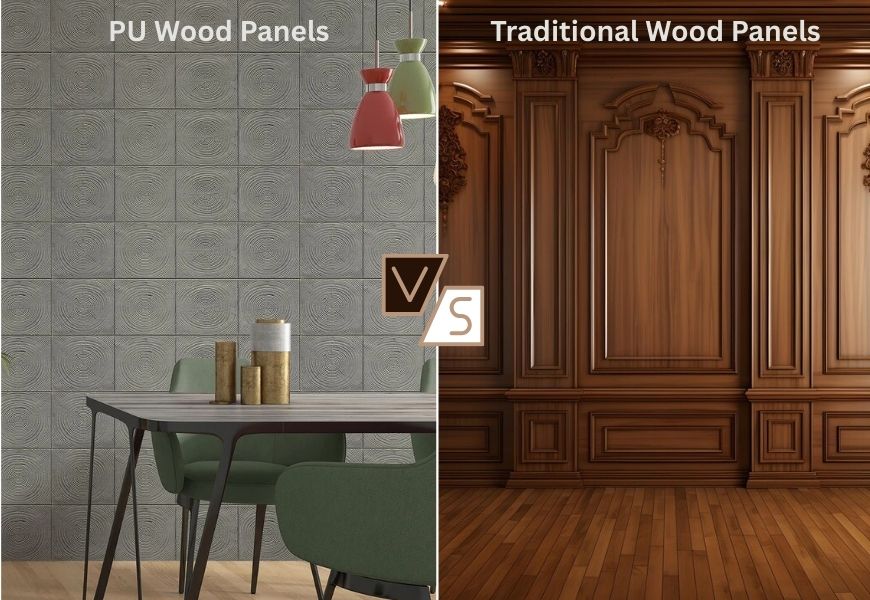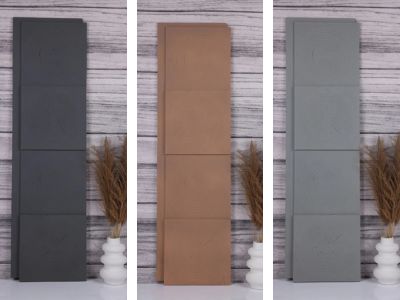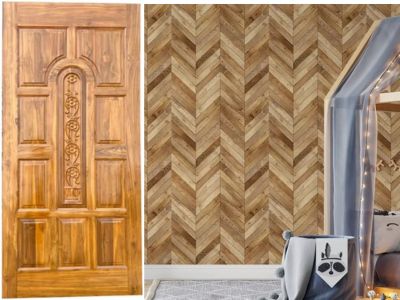
Are you worried about choosing wood panels that crack and leak?
OR are you someone who's spending too much time and money on maintaining your interiors?
You want the feel of wood for your interiors, but are afraid of not being able to keep up with maintenance costs and constant care?
If this is you, then don't worry. You'll find your answers here today!
The durable and effective alternative to traditional wood panel is PU Wood Panel.
So let’s break down the two top contenders — PU wood panels and traditional wood panels — and see which one really fits your needs, your lifestyle, and your space.
What exactly are PU wood panels?

PU wood panels are decorative wall panels crafted from high-density polyurethane (PU) foam. This material allows the panels to realistically mimic natural materials like wood, stone, and brick, offering the aesthetic appeal of these materials without their associated drawbacks.
They are mostly used in wardrobes, kitchens, wall cladding, and decorative applications. They are a perfect example of style with efficiency
What are traditional wood panels?

Traditional wood panels are made from real wood, like plywood or solid timber. They give a warm, natural feel that works great in vintage or earthy interiors. But they need a lot of care — they can swell, get termites, or lose shine over time. They're perfect if you love that authentic wood look and don't mind the upkeep.
PU Wood Panels vs. Traditional Wood Panels

1.The Look & Feel – Natural vs. Polished Elegance
Traditional wood panels exude an unmatched, organic beauty—each grain and knot a testament to nature’s artistry. Their raw, rustic appeal brings warmth and character to any space.
PU wall panels, however, offer the best of both worlds. Designed to replicate the rich textures and patterns of natural wood, they capture the essence of tradition while delivering a polished, contemporary elegance. With a wide range of shades, finishes, and textures, PU panels provide the flexibility to match any interior style—minus the maintenance and cost of real wood.
2. Durability Check: Which One Lasts Longer?
Here’s where PU wood panels truly shine.
PU Wood Panels: Built to Withstand
- Water-Resistant & Termite-Proof: Ideal for areas prone to moisture like kitchens, bathrooms, and coastal homes.
- No Swelling or Cracking: PU panels remain stable in humid conditions and don’t crack over time.
- Low Maintenance: No need for regular treatment or upkeep, making them a hassle-free choice for modern spaces.
Traditional Wood Panels: Natural but Demanding
- Sensitive to Moisture: Tends to swell, warp, or crack if exposed to humidity without proper care.
- Attracts Termites: Requires anti-termite treatments to prevent infestations.
- High Maintenance: Needs regular polishing, sealing, and maintenance to retain its beauty and durability.
3. Maintenance & Upkeep – Easy or Effort?
PU wood panels are practically stress-free.
You don’t need to polish or treat them every year. A simple wipe with a cloth keeps them shining. This makes them a dream come true for busy homeowners, commercial spaces, or rental properties.
In contrast, traditional wood panels demand attention — polishing, sealing, and occasional pest control. If you love the hands-on care and the old-world charm, that might be a worthy trade-off. But for most modern-day users, convenience is king.
4. Eco-Friendliness: Which Is Greener?
It’s a close one here.
Traditional wood is natural, yes, but cutting down trees for panels raises sustainability concerns unless the wood is responsibly sourced. On the other hand, PU wood panels are made using eco-conscious technologies, and many manufacturers (like Artisun Industries!) follow sustainable practices.
Also, since PU panels last longer and don’t need frequent replacements, they indirectly reduce environmental impact.
5. Cost Factor – What's More Pocket-Friendly?
The costs of PU wood panels are often lower compared to premium hardwood options. Add to that the minimal maintenance and longevity, and you’ve got yourself a cost-effective winner.
Traditional wood panels, especially those made of teak, oak, or walnut, come with a premium price tag. And remember, that’s just the start — maintenance costs add up over time.
6. Customization & Versatility
PU wood panels are a designer’s playground.
Want a glossy walnut finish or a matte oak look? Need a 3D design or a custom texture? PU panels offer unlimited design flexibility — and they can fit into both modern and traditional aesthetics.
You can go for customization with traditional wood also but it's costlier and requires more labor costs.
Final Verdict: Which One Should YOU Choose?
If you want natural texture, timeless beauty, and, of course, don't mind the upkeep expenses and effort, then traditional wood panels are a fit. But if you are looking for something low-maintenance yet durable and elegant, then PU wood panels are the clear winner.
|
Features |
PU Wood Panels |
Traditional Wood Panels |
|
Appearance |
Sleek, uniform, modern finishes |
Natural, rustic, and timeless charm |
|
Durability |
Water-resistant, termite-proof, long-lasting |
Prone to swelling, termites, and cracking |
|
Maintenance |
Low maintenance; easy to clean |
High maintenance; needs regular polishing |
|
Cost |
Affordable, cost-effective in the long run |
Expensive, with added upkeep costs |
|
Installation |
Easy and quick |
Heavier, more time-consuming |
|
Customization |
Highly customizable with color options. |
Limited customization; intricate designs are costly |
|
Eco-friendliness |
Made with sustainable practices and lasts longer |
Natural but may involve tree-cutting |
|
Best for |
Modern homes, commercial interiors, rentals |
Heritage homes, rustic spaces |
Conclusion
At Artisun Industries, we blend innovative technology with premium craftsmanship to bring you PU wood panels that are stylish, sturdy, and sustainable.
From minimalist interiors to bold statements — our panels are made to transform spaces with ease. Browse our PU wood panel collection and see why more homeowners, architects, and designers are choosing PU wood panels over the old-school charm.
Contact us for more information or inquiries.

